Yingwu Chen
Reinforcement Learning-assisted Evolutionary Algorithm: A Survey and Research Opportunities
Aug 28, 2023


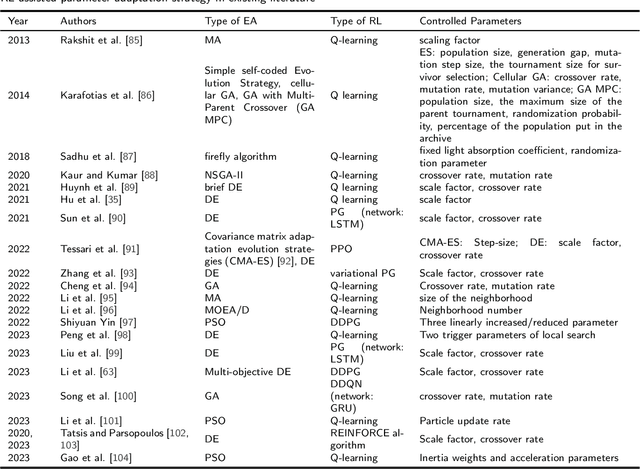
Abstract:Evolutionary algorithms (EA), a class of stochastic search methods based on the principles of natural evolution, have received widespread acclaim for their exceptional performance in various real-world optimization problems. While researchers worldwide have proposed a wide variety of EAs, certain limitations remain, such as slow convergence speed and poor generalization capabilities. Consequently, numerous scholars actively explore improvements to algorithmic structures, operators, search patterns, etc., to enhance their optimization performance. Reinforcement learning (RL) integrated as a component in the EA framework has demonstrated superior performance in recent years. This paper presents a comprehensive survey on integrating reinforcement learning into the evolutionary algorithm, referred to as reinforcement learning-assisted evolutionary algorithm (RL-EA). We begin with the conceptual outlines of reinforcement learning and the evolutionary algorithm. We then provide a taxonomy of RL-EA. Subsequently, we discuss the RL-EA integration method, the RL-assisted strategy adopted by RL-EA, and its applications according to the existing literature. The RL-assisted procedure is divided according to the implemented functions including solution generation, learnable objective function, algorithm/operator/sub-population selection, parameter adaptation, and other strategies. Finally, we analyze potential directions for future research. This survey serves as a rich resource for researchers interested in RL-EA as it overviews the current state-of-the-art and highlights the associated challenges. By leveraging this survey, readers can swiftly gain insights into RL-EA to develop efficient algorithms, thereby fostering further advancements in this emerging field.
Ensemble Reinforcement Learning: A Survey
Mar 05, 2023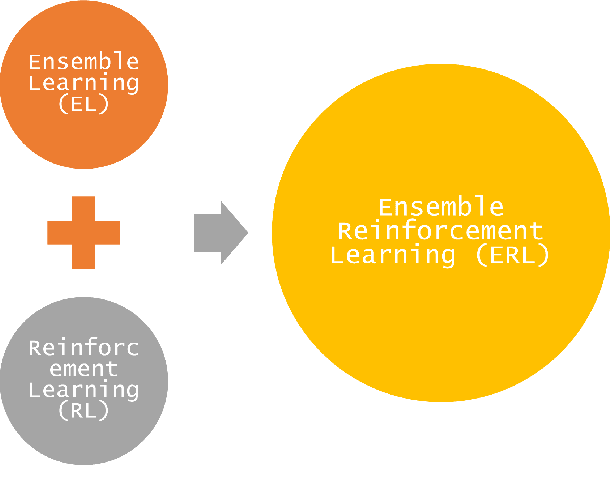
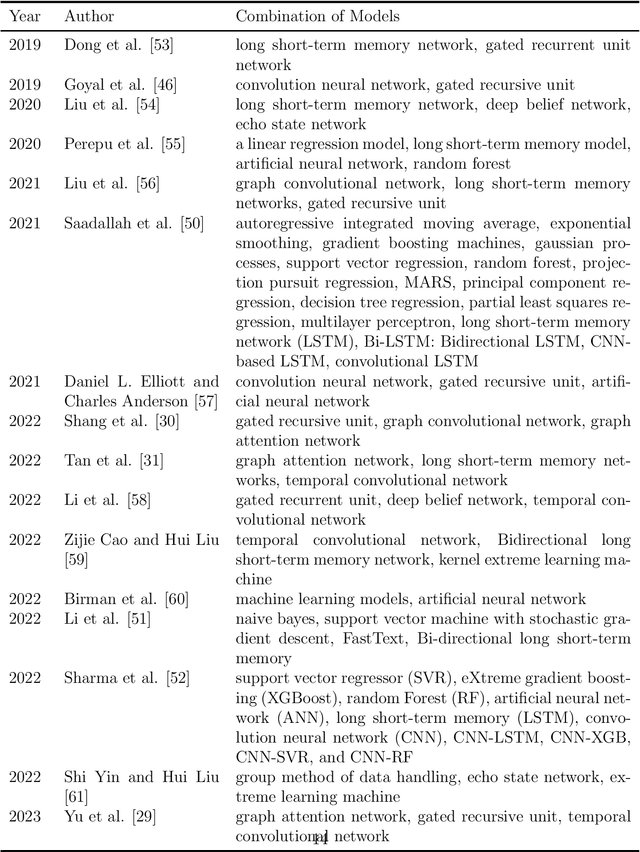
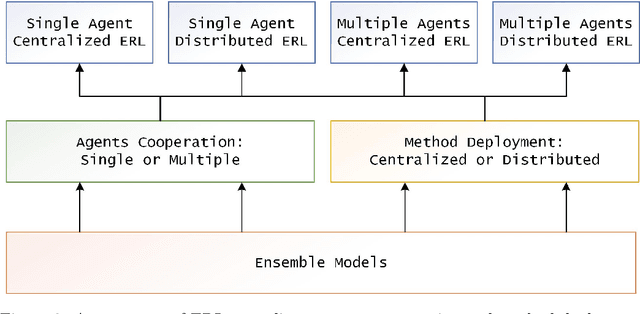
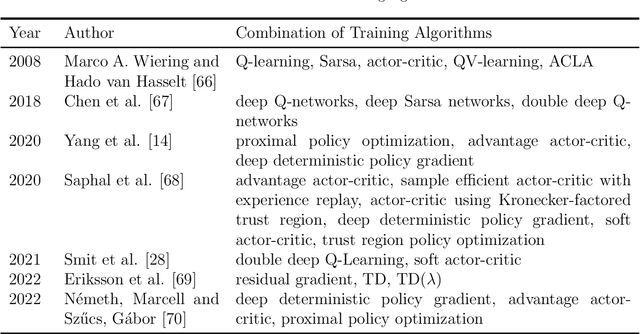
Abstract:Reinforcement learning (RL) has achieved state-of-the-art performance in many scientific and applied problems. However, some complex tasks still are difficult to handle using a single model and algorithm. The highly popular ensemble reinforcement learning (ERL) has become an important method to handle complex tasks with the advantage of combining reinforcement learning and ensemble learning (EL). ERL combines several models or training algorithms to fully explore the problem space and has strong generalization characteristics. This study presents a comprehensive survey on ERL to provide the readers with an overview of the recent advances and challenges. The background is introduced first. The strategies successfully applied in ERL are analyzed in detail. Finally, we outline some open questions and conclude by discussing some future research directions of ERL. This survey contributes to ERL development by providing a guide for future scientific research and engineering applications.
LAGA: A Learning Adaptive Genetic Algorithm for Earth Electromagnetic Satellite Scheduling Problem
Jan 07, 2023Abstract:Earth electromagnetic exploration satellites are widely used in many fields due to their wide detection range and high detection sensitivity. The complex environment and the proliferating number of satellites make management a primary issue. We propose a learning adaptive genetic algorithm (LAGA) for the earth electromagnetic satellite scheduling problem (EESSP). Control parameters are vital for evolutionary algorithms, and their sensitivity to the problem makes tuning parameters usually require a lot of effort. In the LAGA, we use a GRU artificial neural network model to control the parameters of variation operators. The GRU model can utilize online information to achieve adaptive adjustment of the parameters during population search. Moreover, a policy gradient-based reinforcement learning method is designed to update the GRU network parameters. By using an adaptive evolution mechanism in the algorithm, the LAGA can autonomously select crossover operators. Furthermore, a heuristic initialization method, an elite strategy, and a local search method are adopted in the LAGA to enhance the overall performance. The proposed algorithm can obtain a more optimal solution on the EESSP through sufficient experimental validations compared to the state-of-the-art algorithms.
RL-EA: A Reinforcement Learning-Based Evolutionary Algorithm Framework for Electromagnetic Detection Satellite Scheduling Problem
Jun 12, 2022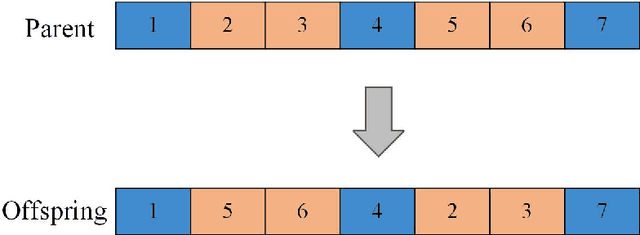

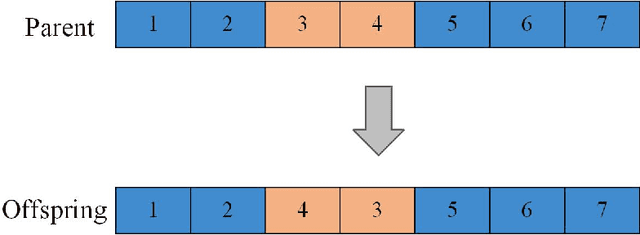

Abstract:The study of electromagnetic detection satellite scheduling problem (EDSSP) has attracted attention due to the detection requirements for a large number of targets. This paper proposes a mixed-integer programming model for the EDSSP problem and an evolutionary algorithm framework based on reinforcement learning (RL-EA). Numerous factors that affect electromagnetic detection are considered in the model, such as detection mode, bandwidth, and other factors. The evolutionary algorithm framework based on reinforcement learning uses the Q-learning framework, and each individual in the population is regarded as an agent. Based on the proposed framework, a Q-learning-based genetic algorithm(QGA) is designed. Q-learning is used to guide the population search process by choosing variation operators. In the algorithm, we design a reward function to update the Q value. According to the problem characteristics, a new combination of <state, action> is proposed. The QGA also uses an elite individual retention strategy to improve search performance. After that, a task time window selection algorithm is proposed To evaluate the performance of population evolution. Various scales experiments are used to examine the planning effect of the proposed algorithm. Through the experimental verification of multiple instances, it can be seen that the QGA can solve the EDSSP problem effectively. Compared with the state-of-the-art algorithms, the QGA algorithm performs better in several aspects.
A Two-stage Framework and Reinforcement Learning-based Optimization Algorithms for Complex Scheduling Problems
Mar 10, 2021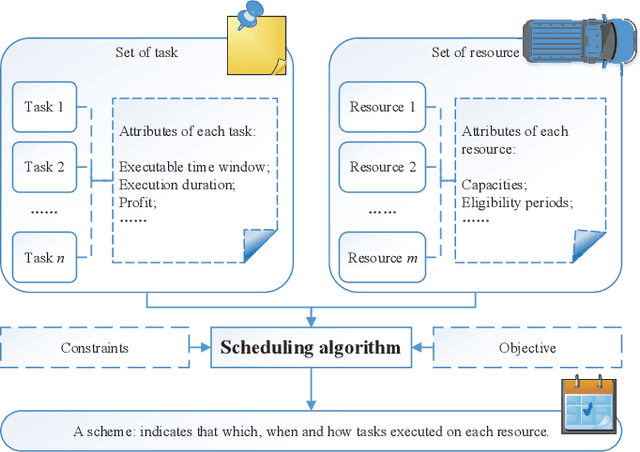
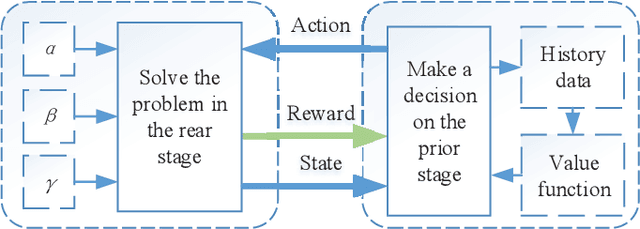
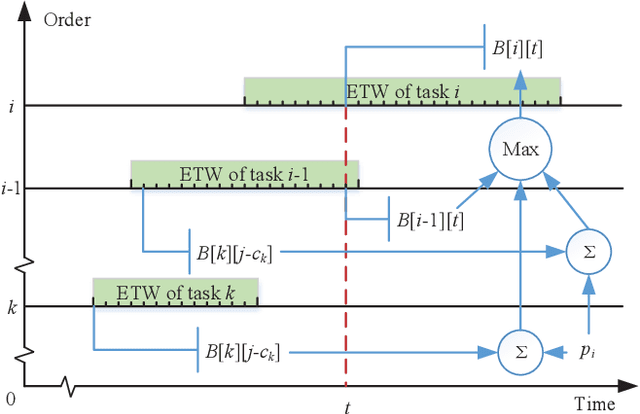
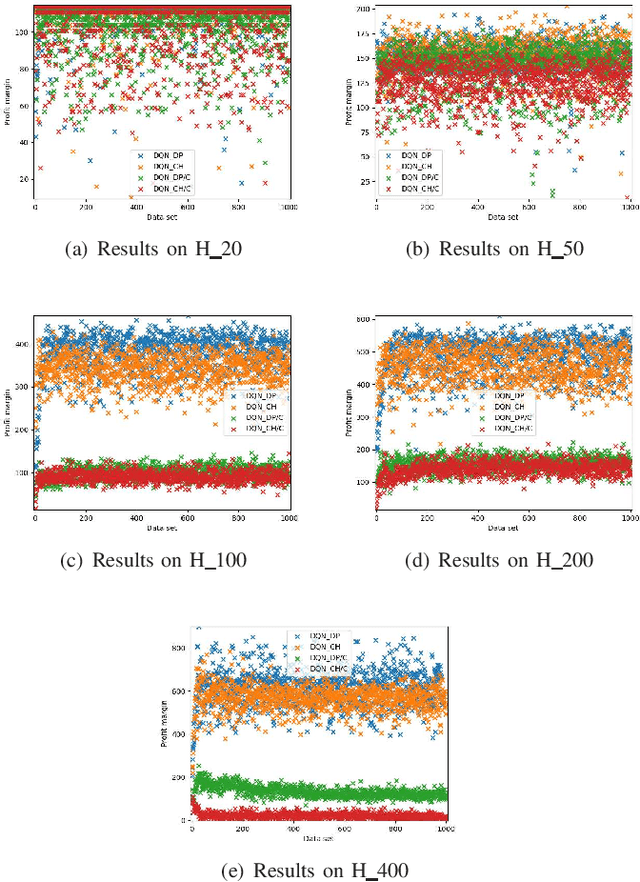
Abstract:There hardly exists a general solver that is efficient for scheduling problems due to their diversity and complexity. In this study, we develop a two-stage framework, in which reinforcement learning (RL) and traditional operations research (OR) algorithms are combined together to efficiently deal with complex scheduling problems. The scheduling problem is solved in two stages, including a finite Markov decision process (MDP) and a mixed-integer programming process, respectively. This offers a novel and general paradigm that combines RL with OR approaches to solving scheduling problems, which leverages the respective strengths of RL and OR: The MDP narrows down the search space of the original problem through an RL method, while the mixed-integer programming process is settled by an OR algorithm. These two stages are performed iteratively and interactively until the termination criterion has been met. Under this idea, two implementation versions of the combination methods of RL and OR are put forward. The agile Earth observation satellite scheduling problem is selected as an example to demonstrate the effectiveness of the proposed scheduling framework and methods. The convergence and generalization capability of the methods are verified by the performance of training scenarios, while the efficiency and accuracy are tested in 50 untrained scenarios. The results show that the proposed algorithms could stably and efficiently obtain satisfactory scheduling schemes for agile Earth observation satellite scheduling problems. In addition, it can be found that RL-based optimization algorithms have stronger scalability than non-learning algorithms. This work reveals the advantage of combining reinforcement learning methods with heuristic methods or mathematical programming methods for solving complex combinatorial optimization problems.
 Add to Chrome
Add to Chrome Add to Firefox
Add to Firefox Add to Edge
Add to Edge